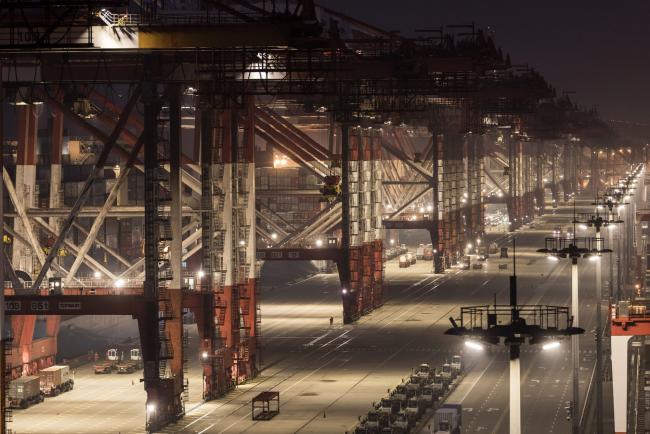(Bloomberg) -- China’s exports declined less than expected in October as optimism rose about an interim trade deal with the U.S., while imports contracted for a sixth straight month.
Exports decreased 0.9% in dollar terms in October from a year earlier, while imports dropped by 6.4%, the customs administration said Friday. That left a trade surplus of $42.81 billion for the month.
Key Insights
- The improvement in exports will provide some relief to companies, which are being squeezed by falling profits amid factory deflation. Falling imports point to a slowing domestic economy.
- The U.S. and China have agreed to roll back tariffs on each other’s goods in phases as they work toward a deal, both sides said Thursday.
- China’s trade surplus with the U.S. was $26.42 billion in October; Exports to the U.S. are now down 11.3% in dollar terms in the year to date from the same period in 2018.
- At the same time, the date of the summit may be pushed back to December as the two sides wrangle over the details.
- “There are some signs of stabilization for exporters. And with the possible rollback of tariffs, next year is very likely to stage a recovery for exports,”said Gai Xinzhe, a senior analyst at Sino-Ocean Capital in Beijing.
“A slower pace of decline in exports in October offers some encouragement for the economy’s performance heading into year-end. That said, a continued slide in imports, coupled with contraction in the new orders component of the official manufacturing PMI, suggest domestic demand remains weak -- tempering any optimism about growth bottoming out near term.”
David Qu and Qian Wan, Bloomberg Economics
For the full note click here
Get More
- Economists had forecast that exports would drop by 3.9% while imports would contract by 7.8%.
- “The slightly improving imports may be largely due to the moderate pickup in domestic infrastructure investment, and it may last for some time,” said Betty Wang, senior China economist at Australia & New Zealand Banking Group Ltd. in Hong Kong. “On exports, the market is getting excited about the phase-one deal, but we think that is only the short-term optimism instead of long-term certainty. There is still lack of clear sign of recovery. It is too early to say anything now.”
To contact Bloomberg News staff for this story: Miao Han in Beijing at mhan22@bloomberg.net;Tomoko Sato in Tokyo at tsato3@bloomberg.net
To contact the editors responsible for this story: Jeffrey Black at jblack25@bloomberg.net, Sharon Chen
©2019 Bloomberg L.P.
